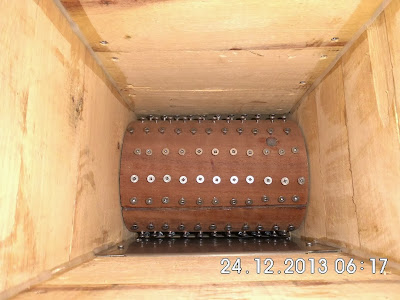It's the cleaning. Before starting the
scratter was hosed out to remove any dust, the press was also rinsed
and the demijohns had a sulphur solution which needed rinsing out.
 |
| The scratter drum |
Then afterwards the process is
repeated. The afterwards cleaning is really critical and must be
timely. In hot weather the pulp particles and sugars dry quickly and
adhere like glue. As soon as an item is freed from duty it gets a
quick rinse if there are other tasks going on. Then later it gets a
good scrub before drying and storing. With wood articles (or anything
porous) the surfaces are rubbed with Potassium Metabisulphate to
ensure all bugs die. The demijohns are stored with sulphur solution
just in case something is missed in the cleaning. That way it doesn't
take long to bring it back into service.
Once the press is finished its service
and dry it gets a coat of paint on any scratched metal to prevent
rust being in contact with the acidic juice. Nothing worse than a
metallic taste in the wine or cider.
I've found that most of the time involved in making something is engaged in cleaning. A lot of people have a romantic idea about wine making but the reality is it is the worst product to handle from a cleanliness prospective. Grapes leave a sticky residue wherever they have travelled. Often grapes will turn up months later under fridges and cupboards where they have rolled during processing.
Performing the cleaning as you go makes
the chore a little more palatable. It also has a side benefit in that
it provides a chance to reflect on the making tasks. Just mentally
going through the processes and making sure that each step has been
executed. Something akin to to a quality control process. When multi
tasking with multiple batches it's easy to overlook something and a
silent review while working on a less demanding task helps. Having a
check list is important but sometimes in the heat of the moment it
can be easy to forget to tick a box.

No comments:
Post a Comment